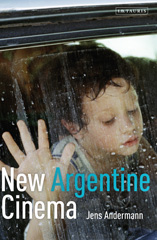New Argentine Cinema
232 p.
Argentine filmmaking from the mid-1990s to the present has enjoyed worldwide success. New Argentine Cinema explores this cinema in order to discover the elements that have made for this success, in relation to the country's profound political, social and cultural crisis during the same period. Jens Andermann shows how the most recent wave of films differs markedly from the Argentine cinema of the preceding decade, following the end of the dictatorship in 1983. Studying films by Lisandro Alonso, Albertina Carri, Lucrecia Martel, Raul Perrone, Martin Rejtman, and Pablo Trapero, among others, he identifies a shift in aesthetic sensibilities between these directors and those of the previous generation as well as a profound change in the way films are being made, and their relation to the audiovisual field at large. In combining close comparative analyses with a review of the changing models of production, editing, actorship and location, Andermann uncovers the ways in which Argentine films have managed to constru
ct a complex, multilayered account of their own present, as shot through - or 'perforated' - by the still unresolved legacies of the past. [Publisher's text].
Special access authorizations may apply; please contact us for further information.
-
Informazioni
ISBN: 9780857720894
COLLANA


